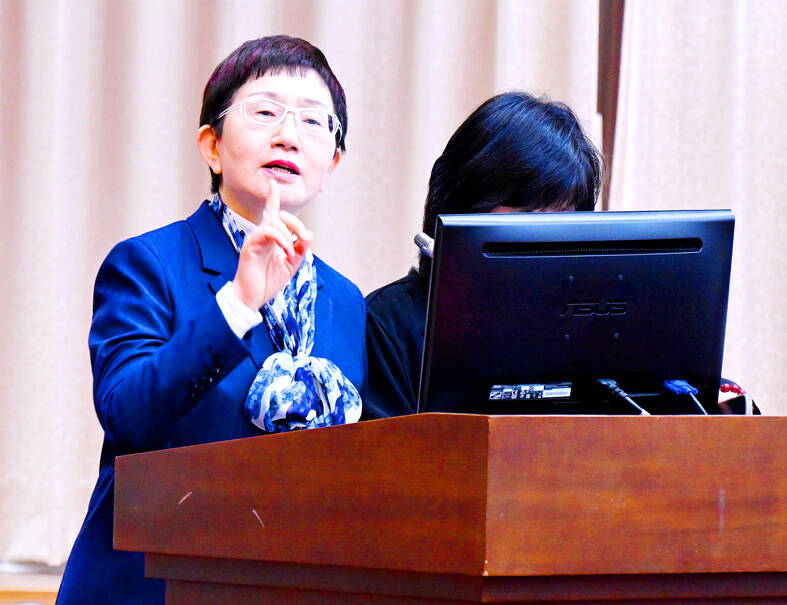September’s export expansion was not an isolated incident, but sign of a nascent recovery that would grow more evident and reliable from this quarter as inventory adjustments draw to an end, Minister of Finance Chuang Tsui-yun (莊翠雲) said yesterday.
Chuang shared her observations at a meeting of the legislature’s Finance Committee in which lawmakers raised concern over the health of Taiwan’s economy after exports slipped back into contraction mode in October.
“The positive growth in [September] exports is not transient, with export value forecast to exceed NT$30 billion [US$955 million] every month this quarter, lifting the full-year figure past the NT$400 billion mark, the third highest in history,” Chuang said.

Photo: Chu Pei-hsiung, Taipei Times
The Ministry of Finance is to release last month’s export data on Friday. It has forecast an uptick of 3 to 6 percent from a year earlier, supported by restocking demand ahead of the Christmas season and a sustained boom in artificial intelligence (AI) applications.
Taiwan is home to the world’s largest suppliers of electronics used in smartphones, personal computers and vehicles, as well as servers and graphic cards used in AI equipment and solutions.
Exports in the first 10 months of this year totaled NT$355.1 billion, making it easy for the full-year number to surpass the NT$400 billion threshold, Chuang said.
Major tech firms have also provided positive guidance for their business prospects this quarter and beyond, citing brightening end-market demand amid lingering uncertainty linked to geopolitical tensions, sticky inflation and restrictive monetary policies.
Chuang agreed that it was too early to be optimistic, and companies at home and abroad largely maintain a cautious approach.
Global research institutes expect the US to see an economic slowdown next year after putting up stronger-than-expected GDP showings this year. China poses another source of unease amid ongoing global supply chain realignment, capital outflows and risks linked to its property and financial sectors.
The two largest economies account for more than 50 percent of Taiwanese exports.
State-run banks have cut exposure to China to NT$214.3 billion, or a controllable 12 percent of their net worth, Chuang said.
The finance ministry will step up oversight of risk controls in state-run financial institutions to make sure they are well-equipped to deal with potential bad loans in the Chinese market, she said.
In addition, the ministry said its efforts to boost mobile payments among small retailers through tax breaks hit a snag as only 17,099 businesses signed on from 2018 to this year.
Mobile payments gained rapid growth initially, but soon slowed as small businesses voiced concern over transaction safety and increases in operating costs, it said.
Chuang said she would seek to gain a better understanding of the situation and introduce more effective stimulus measures.

CHAOS: Iranians took to the streets playing celebratory music after reports of Khamenei’s death on Saturday, while mourners also gathered in Tehran yesterday Iranian Supreme Leader Ayatollah Ali Khamenei was killed in a major attack on Iran launched by Israel and the US, throwing the future of the Islamic republic into doubt and raising the risk of regional instability. Iranian state television and the state-run IRNA news agency announced the 86-year-old’s death early yesterday. US President Donald Trump said it gave Iranians their “greatest chance” to “take back” their country. The announcements came after a joint US and Israeli aerial bombardment that targeted Iranian military and governmental sites. Trump said the “heavy and pinpoint bombing” would continue through the week or as long

TRUST: The KMT said it respected the US’ timing and considerations, and hoped it would continue to honor its commitments to helping Taiwan bolster its defenses and deterrence US President Donald Trump is delaying a multibillion-dollar arms sale to Taiwan to ensure his visit to Beijing is successful, a New York Times report said. The weapons sales package has stalled in the US Department of State, the report said, citing US officials it did not identify. The White House has told agencies not to push forward ahead of Trump’s meeting with Chinese President Xi Jinping (習近平), it said. The two last month held a phone call to discuss trade and geopolitical flashpoints ahead of the summit. Xi raised the Taiwan issue and urged the US to handle arms sales to

State-run CPC Corp, Taiwan (CPC, 台灣中油) yesterday said that it had confirmed on Saturday night with its liquefied natural gas (LNG) and crude oil suppliers that shipments are proceeding as scheduled and that domestic supplies remain unaffected. The CPC yesterday announced the gasoline and diesel prices will rise by NT$0.2 and NT$0.4 per liter, respectively, starting Monday, citing Middle East tensions and blizzards in the eastern United States. CPC also iterated it has been reducing the proportion of crude oil imports from the Middle East and diversifying its supply sources in the past few years in response to geopolitical risks, expanding

Pro-democracy media tycoon Jimmy Lai’s (黎智英) fraud conviction and prison sentence were yesterday overturned by a Hong Kong court, in a surprise legal decision that comes soon after Lai was jailed for 20 years on a separate national security charge. Judges Jeremy Poon (潘兆初), Anthea Pang (彭寶琴) and Derek Pang (彭偉昌) said in the judgement that they allowed the appeal from Lai, and another defendant in the case, to proceed, as a lower court judge had “erred.” “The Court of Appeal gave them leave to appeal against their conviction, allowed their appeals, quashed the convictions and set aside the sentences,” the judges